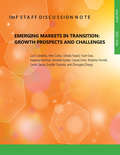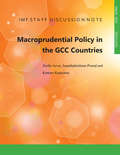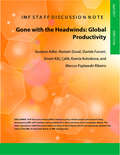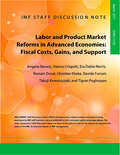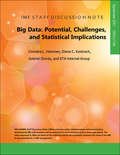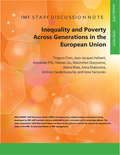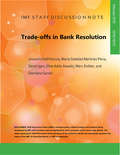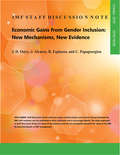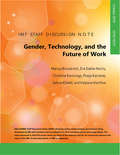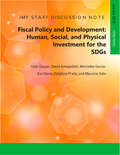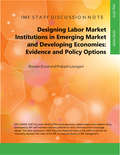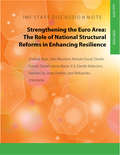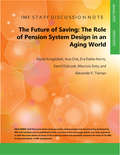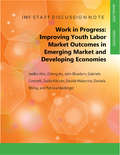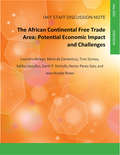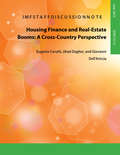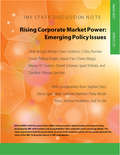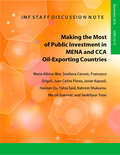- Table View
- List View
IMF Staff Country Reports
by Michael T. Hadjimichael P. ChabrierA report from the International Monetary Fund.
IMF Staff Country Reports
by Policy Development Review DepartmentsA report from the International Monetary Fund.
IMF Staff Country Reports
by Taline Koranchelian Reza Vaez-ZadehA report from the International Monetary Fund.
IMF Staff Discussion Note
by Kalpana Kochhar Evridiki Tsounta Luis Cubeddu Roberto Perrelli Yuan Gao Annette Kyobe Alex Culiuc Ghada Fayad Ceyda Oner Sarah Sanya Zhongxia ZhangA report from the International Monetary Fund.
IMF Staff Discussion Note
by Ananthakrishnan Prasad Zsofia Arvai Kentaro KatayamaA report from the International Monetary Fund.
IMF Staff Discussion Note
by International Monetary FundThe Fund has recognized in recent years that one cannot separate issues of economic growth and stability on one hand and equality on the other. Indeed, there is a strong case for considering inequality and an inability to sustain economic growth as two sides of the same coin. Central to the Fund's mandate is providing advice that will enable members' economies to grow on a sustained basis. But the Fund has rightly been cautious about recommending the use of redistributive policies given that such policies may themselves undercut economic efficiency and the prospects for sustained growth (the so-called "leaky bucket" hypothesis written about by the famous Yale economist Arthur Okun in the 1970s). This SDN follows up the previous SDN on inequality and growth by focusing on the role of redistribution. It finds that, from the perspective of the best available macroeconomic data, there is not a lot of evidence that redistribution has in fact undercut economic growth (except in extreme cases). One should be careful not to assume therefore-as Okun and others have-that there is a big tradeoff between redistribution and growth. The best available macroeconomic data do not support such a conclusion.
IMF Staff Discussion Note
by International Monetary FundThe Fund has recognized in recent years that one cannot separate issues of economic growth and stability on one hand and equality on the other. Indeed, there is a strong case for considering inequality and an inability to sustain economic growth as two sides of the same coin. Central to the Fund's mandate is providing advice that will enable members' economies to grow on a sustained basis. But the Fund has rightly been cautious about recommending the use of redistributive policies given that such policies may themselves undercut economic efficiency and the prospects for sustained growth (the so-called "leaky bucket" hypothesis written about by the famous Yale economist Arthur Okun in the 1970s). This SDN follows up the previous SDN on inequality and growth by focusing on the role of redistribution. It finds that, from the perspective of the best available macroeconomic data, there is not a lot of evidence that redistribution has in fact undercut economic growth (except in extreme cases). One should be careful not to assume therefore-as Okun and others have-that there is a big tradeoff between redistribution and growth. The best available macroeconomic data do not support such a conclusion.
IMF Staff Discussion Note
by International Monetary FundThe Fund has recognized in recent years that one cannot separate issues of economic growth and stability on one hand and equality on the other. Indeed, there is a strong case for considering inequality and an inability to sustain economic growth as two sides of the same coin. Central to the Fund's mandate is providing advice that will enable members' economies to grow on a sustained basis. But the Fund has rightly been cautious about recommending the use of redistributive policies given that such policies may themselves undercut economic efficiency and the prospects for sustained growth (the so-called "leaky bucket" hypothesis written about by the famous Yale economist Arthur Okun in the 1970s). This SDN follows up the previous SDN on inequality and growth by focusing on the role of redistribution. It finds that, from the perspective of the best available macroeconomic data, there is not a lot of evidence that redistribution has in fact undercut economic growth (except in extreme cases). One should be careful not to assume therefore-as Okun and others have-that there is a big tradeoff between redistribution and growth. The best available macroeconomic data do not support such a conclusion.
IMF Staff Discussion Note
by International Monetary FundThe Fund has recognized in recent years that one cannot separate issues of economic growth and stability on one hand and equality on the other. Indeed, there is a strong case for considering inequality and an inability to sustain economic growth as two sides of the same coin. Central to the Fund's mandate is providing advice that will enable members' economies to grow on a sustained basis. But the Fund has rightly been cautious about recommending the use of redistributive policies given that such policies may themselves undercut economic efficiency and the prospects for sustained growth (the so-called "leaky bucket" hypothesis written about by the famous Yale economist Arthur Okun in the 1970s). This SDN follows up the previous SDN on inequality and growth by focusing on the role of redistribution. It finds that, from the perspective of the best available macroeconomic data, there is not a lot of evidence that redistribution has in fact undercut economic growth (except in extreme cases). One should be careful not to assume therefore-as Okun and others have-that there is a big tradeoff between redistribution and growth. The best available macroeconomic data do not support such a conclusion.
IMF Staff Discussion Note (Imf Staff Discussion Notes Ser. #Staff Discussion Notes No. 14/02)
by International Monetary FundA report from the International Monetary Fund.
IMF Staff Discussion Note (Imf Staff Discussion Notes Ser. #Staff Discussion Notes No. 14/02)
by International Monetary FundA report from the International Monetary Fund.
IMF Staff Discussion Note (Imf Staff Discussion Notes Ser. #Staff Discussion Notes No. 14/02)
by International Monetary FundA report from the International Monetary Fund.
IMF Staff Discussion Note (Imf Staff Discussion Notes Ser. #Staff Discussion Notes No. 14/02)
by International Monetary FundA report from the International Monetary Fund.
IMF Staff Discussion Note (Imf Staff Discussion Notes Ser. #Staff Discussion Notes No. 14/02)
by International Monetary FundA report from the International Monetary Fund.
IMF Staff Discussion Note (Imf Staff Discussion Notes Ser. #Staff Discussion Notes No. 14/02)
by International Monetary FundA report from the International Monetary Fund.
IMF Staff Discussion Note (Imf Staff Discussion Notes Ser. #Staff Discussion Notes No. 14/02)
by International Monetary FundA report from the International Monetary Fund.
IMF Staff Discussion Note (Imf Staff Discussion Notes Ser. #Staff Discussion Notes No. 14/02)
by International Monetary FundA report from the International Monetary Fund.
IMF Staff Discussion Note (Imf Staff Discussion Notes Ser. #Staff Discussion Notes No. 14/02)
by International Monetary FundA report from the International Monetary Fund.
IMF Staff Discussion Note (Imf Staff Discussion Notes Ser. #Staff Discussion Notes No. 14/02)
by International Monetary FundA report from the International Monetary Fund.
IMF Staff Discussion Note (Imf Staff Discussion Notes Ser. #Staff Discussion Notes No. 14/02)
by International Monetary FundA report from the International Monetary Fund.
IMF Staff Discussion Note, No: 15/12
by International Monetary FundA report from the International Monetary Fund.
IMF Staff Discussion Note: Emerging Policy Issues (Staff Discussion Notes Ser. #Staff Discussion Notes No. 14/02)
by International Monetary FundA report from the International Monetary Fund.
IMF Staff Discussion Note: Making the Most of Public Investment in MENA and CCA Oil-Exporting Countries
by International Monetary FundA report from the International Monetary Fund.

